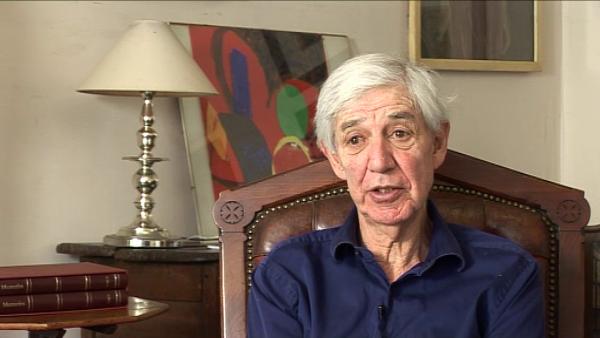NEXT STORY

The nonsense of bioethics
RELATED STORIES

NEXT STORY

The nonsense of bioethics
RELATED STORIES


|
Views | Duration | |
|---|---|---|---|
| 21. Consciousness | 1 | 577 | 03:09 |
| 22. The little-understood question of cells' positional identity | 363 | 04:55 | |
| 23. Sydney Brenner: The local genius | 529 | 02:09 | |
| 24. 'Reading rots the mind' | 839 | 01:04 | |
| 25. Is science dangerous? | 581 | 04:50 | |
| 26. The nonsense of bioethics | 1 | 390 | 02:11 |
| 27. Exciting ideas that ought to be researched | 340 | 02:27 | |
| 28. The relationship between evolution and development | 278 | 02:22 | |
| 29. A theory about metamorphosis | 216 | 02:05 | |
| 30. 'Soil mechanics wasn't very sexy, but then neither was cell... | 188 | 02:45 |


I was very flattered to be invited by the Royal Society... to give the Medawar Lecture, and I chose as my title Is Science Dangerous? You know, there are many people who think that science really can lead to very bad things like — oh gosh — eating all that meat, which made mad cow disease, and so forth. And I decided to... to really look at... to what the evidence is that science is really dangerous. And the line that I took first of all, is that reliable science has no ethical content in it whatsoever, it’s the way the world is. If there are genes for homosexuality, it’s neither good nor bad, that’s the way the world is. And a very important — I claim — and I don’t think many people have followed this up, to distinguish between science and technology. Technology is the application of science to certain things, and that can have ethical... have ethical implications. But scientific knowledge itself has zero ethics. And I think a great deal of the so-called ethical issues in relation to science are what... are what I think Mark Twain would have called moral masturbation. I think when one comes to biology and one looks at bioethics... bioethics, and asks what are the real ethical issues in relation to biology... and I’m really talking about the application of biology, well, there’s obviously the issue of safety. You don’t want to give drugs or try drugs out on people unless you’re going to... unless you’ve got some good evidence that they’re going to be safe for the individual. That’s hardly a big bioethical issue. There was a very nasty issue when people really were trying to show, or to... to argue, that certain people shouldn’t... should be... not be allowed to have children if they weren’t intelligent enough. Well, I mean that’s just monstrously bad behaviour, and I’m glad that that’s all largely disappeared. But there really are very few bioethical issues. There are these things about GM crops, you know, whether putting various genes into various crops in order to help them grow will lead to people developing certain illnesses. Well, these are issues about... it’s just issues about safety. And of course the real bioethical issues, I suppose the closer ones, are... what about the nature of the human embryo? Embryonic stem cells, there’s a... in the human embryo, at an early stage, there are a group of cells which are called embryonic stem cells. If you take these and put them in culture, they will grow almost forever, and they can give rise to almost any type of cell, and they can be used... some people have tried to use them to replace nerval... damage... nerve damage, and all sort of other… it’s the basis of regenerative medicine. But, certain religious groups said you should not be taking these cells from the early human embryo, because the early human embryo is a human being. And I think the evidence for this is zero, and this is what I would call moral masturbation. Now, it’s interesting to ask the question, when does the human embryo become a human being? If you go back to St Augustine, the ideas — oh, going back in the Church, going back, oh a very long time — it used to be thought round about 30 to 60 days, men and women were in the heart; you could tell the heart beating, that’s when the person... when the soul enters the embryo, and it became a person. And then about 50 years ago, the Catholic Church, without any evidence or reasoning whatsoever, decided that the fertilised egg is a human being. And I am totally and utterly opposed to that. And I just want to remind one that even in human development, many fertilised eggs in women don’t go on to development; something goes wrong, and they die. I don’t think anyone really believes that those are people really dying, and I am totally opposed to the idea of thinking about the early human embryo as being a human being.
Lewis Wolpert (1929-2021) CBE FRS FRSL was a developmental biologist, author, and broadcaster. He was educated at the University of Witwatersrand (BSc), Imperial College London, and at King's College London (PhD). He was Emeritus Professor of Biology as applied to medicine in the Department of Anatomy and Developmental Biology at University College London. In addition to his scientific and research publications, he wrote about his own experience of clinical depression in Malignant Sadness: The Anatomy of Depression (1999).
Title: Is science dangerous?
Listeners: Eleanor Lawrence
Eleanor Lawrence is a freelance science writer and editor, and co-author of Longman Dictionary of Environmental Science.
Tags: Royal Society, St Augustine
Duration: 4 minutes, 50 seconds
Date story recorded: April 2010
Date story went live: 14 June 2010